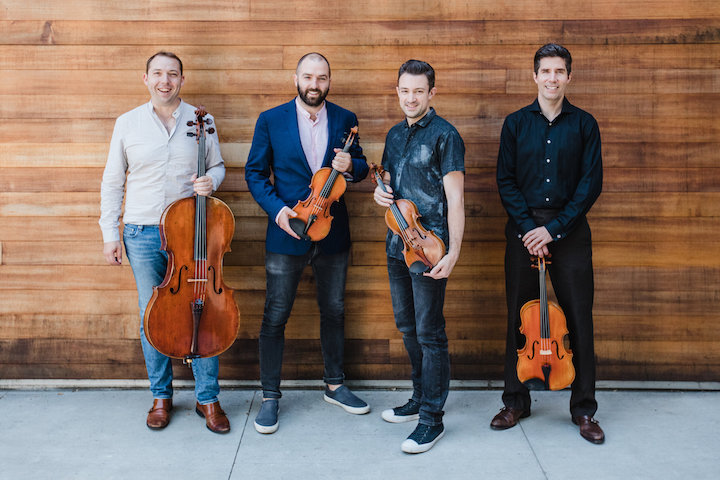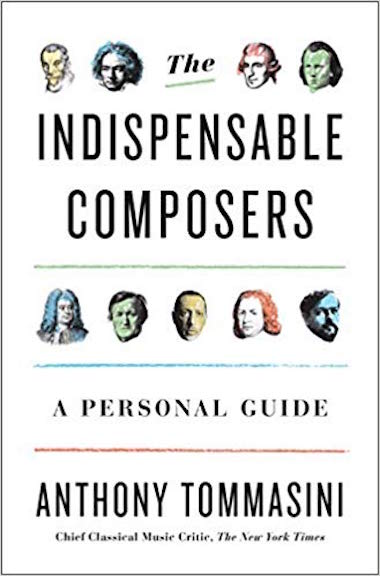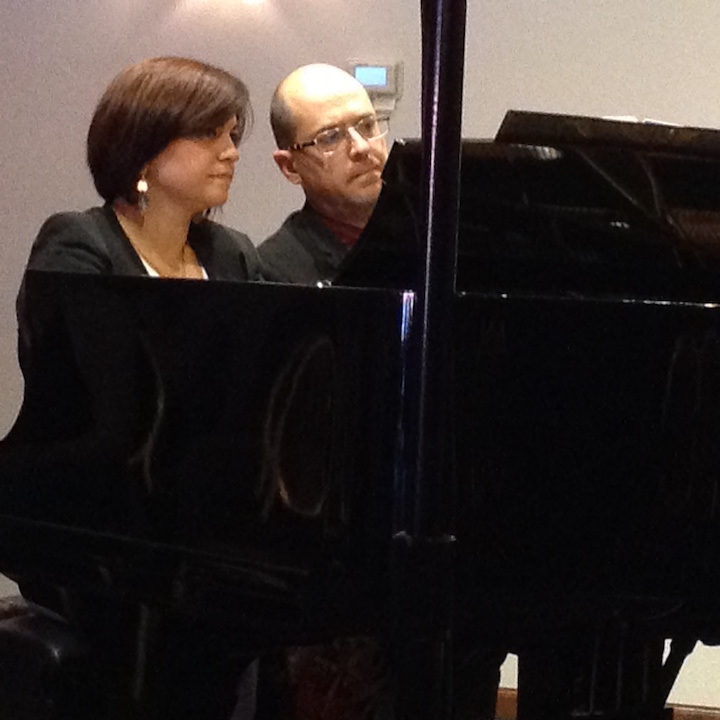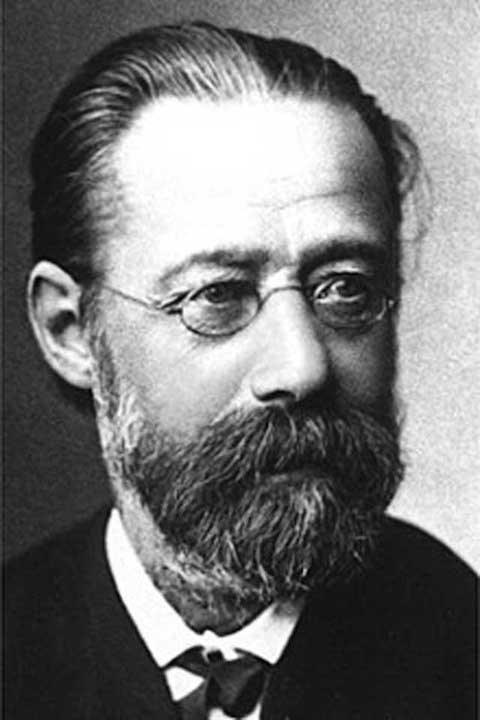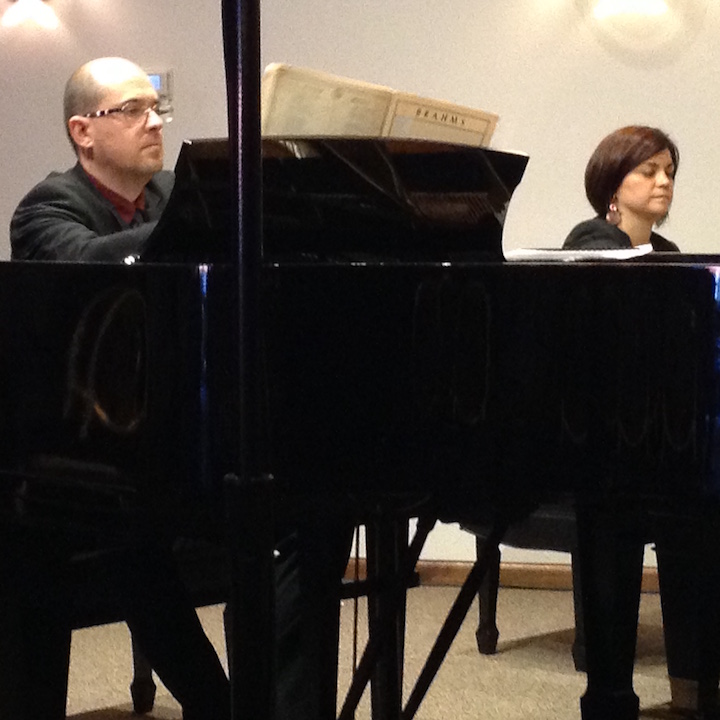The Well-Tempered Ear
Here are Gramophone’s 12 best recordings for March
2 Comments
PLEASE HELP THE EAR. IF YOU LIKE A CERTAIN BLOG POST, SPREAD THE WORD. FORWARD A LINK TO IT OR, SHARE IT or TAG IT (not just “Like” it) ON FACEBOOK. Performers can use the extra exposure to draw potential audience members to an event. And you might even attract new readers and subscribers to the blog.
By Jacob Stockinger
Gramophone magazine, based in the UK, is probably the best and most influential periodical about classical music for the general public.
Every month, the editors pick a recording of the month with 11 others to make up a dozen great opportunities for listening. The reviews — which often favor British performers and composers — include links to excerpts on streaming services.
Would you like to hear the prolific super-virtuoso pianist Marc-André Hamelin play his own compositions, including his Variations on a Theme of Paganini? See the YouTube video at the bottom for an astonishing display of pianism.
Or an obscure opera by Leos Janacek?
Or historic recordings of the violinist Joseph Szigeti?
Or the contemporary composer Nicola LeFanu?
Maybe a spring bouquet of songs about flowers?
Then check out this month’s choices for the Best Of.
And if these reviews interest you, check out the other stories and reviews at the bottom of the Gramophone webpage.
Here is a link:
Tags: #BlogPost, #BlogPosting, #FacebookPost, #FacebookPosting, #WebPage, #YouTubevideo, 2024, Apple, Apple Music, Apple Music Classical, Arts, Asia, asian, astonishing, audience, Baroque, Bartok, Beethoven, Belgium, best, best of, Bloch, blog, bouquet, British, Britten, Canada, Canadian Broadcast System, CBC, Cello, Chamber music, choral music, Classical music, composer, Concert, concerto, conductor, contemporary composer, contemporary music, critic, Curtis Institute, Curtis Institute of Music, Debussy, display, Dvorak, Early music, Europe, Facebook, favor, features, flowers, Google, Google Alert, Google Search, Gramophone, Great Britain, Handel, Haydn, hear, historic, Hungarian, Hungary, influence, influential, interest, IOS, Ives, Jacob Stockinger, Jacqueline Fontyn, Janacek, Johann Sebastian Bach, Joseph Szigeti, label, Lassus, Lera Auerbach, link, Living composer, Ludwig van Beethoven, magazine, Marc-André Hamelin, march, Marin Alsop, Milhaud, month, Mozart, Music, music review, New Music, Nicola LeFanu, opera, Orchestra, Paganin, performance, performer, periodical, pianism, Pianist, Piano, Piano Trio, Prokofiev, prolific, public, recorded music, reviews, Russia, Russian, share, singer, Singing, Sonata, song, Spring, stories, story, Stravinsky, stream, streaming, symphony, tag, technique, The Ear, theme and variations, trio, UK, United States, vaughan williams, Viola, Violin, violinist, virtuosic, virtuoso, vocal music, Weinberg, Wolfgang Amadeus Mozart, you, YouTube
Classical music: This Saturday night brings both the Escher String Quartet to the Wisconsin Union Theater and the UW-Madison Choral Union and UW Symphony Orchestra to the Hamel Music Center
1 Comment
PLEASE HELP THE EAR. IF YOU LIKE A CERTAIN BLOG POST, SPREAD THE WORD. FORWARD A LINK TO IT OR, SHARE IT or TAG IT (not just “Like” it) ON FACEBOOK. Performers can use the extra exposure to draw potential audience members to an event. And you might even attract new readers and subscribers to the blog.
CORRECTION: The Ear received the following correction to the story he posted yesterday about the Wisconsin Chamber Orchestra and apologizes for the error:
“There was a change to our rollout in Brookfield. We are only repeating the fifth Masterworks concert on Saturday, May 9, at 7:30 p.m. at the Sharon Lynne Wilson Center for the Arts. We are NOT repeating this Friday’s concert in Brookfield.
“We will perform a Family Series concert of “Beethoven Lives Next Door” on Sunday, March 29, at 3 p.m. at the same Brookfield venue.”
By Jacob Stockinger
The upcoming weekend is a busy one for classical music.
The busiest night is Saturday night when two major concerts will take place: a performance by the Escher String Quartet and the postponed concert by the UW Choral Union and UW Symphony Orchestra with soloists.
Here are details:
ESCHER STRING QUARTET and DAVID FINCKEL
The concert by the Escher String Quartet (below) with cellist David Finckel (below bottom. formerly of the critically acclaimed Emerson String Quartet) takes place on this Saturday night, Jan. 25, at 7:30 p.m. in Shannon Hall of the Wisconsin Union Theater.
The performance is part of the special season celebrating the centennial anniversary of the Concert Series.
The program includes the sublime Quintet in C Major, D. 956, with two cellos, by Franz Schubert and the String Quartet in A minor by the great early 20th-century Viennese violinist and composer Fritz Kreisler (below).
Tickets are $30-$50. For more information and to reserve tickets, go to: https://artsticketing.wisc.edu/Online/default.asp?doWork::WScontent::loadArticle=Load&BOparam::WScontent::loadArticle::article_id=CFC3765F-5F1D-4663-BCA0-985BE3049CF5
For more information about the Escher String Quartet, including a video performance and detailed background, go to: https://union.wisc.edu/events-and-activities/event-calendar/event/escher-string-quartet-with-david-finckel/
UW CHORAL UNION
Also on this Saturday night at 8 p.m., in the Mead Witter Foundation Concert Hall in the new Hamel Music Center at 740 University Avenue, the UW Choral Union and UW Symphony Orchestra (below top), along with two vocal soloists – soprano Chelsie Propst (below middle) and baritone James Harrington (below bottom) — will perform a concert originally scheduled for Dec. 7 and then postponed.
The program, without intermission, is one 80-minute work: the epic and influential “A Sea Symphony” by the great 20th-century British composer Ralph Vaughan Williams (below).
General admission tickets are $18 for the general public and faculty or staff; and $10 for UW students. To reserve tickets, go to Campus Arts Ticketing at: https://artsticketing.wisc.edu/Online/default.asp?doWork::WScontent::loadArticle=Load&BOparam::WScontent::loadArticle::article_id=412623A4-4FB9-40D6-BC23-A425360713EA
Beverly Taylor (below), the longtime director of choral activities at the UW who will retire this spring, sent the following note:
“The text by American poet Walt Whitman presents four symphonic scenes of great breadth and imagination, with lush harmonies and constantly varying tempos and dynamics.” (You can hear the Waves section, or third movement, from “A Sea Symphony” in the YouTube video at the bottom.)
Tags: #20thCentury, #ASeaSymphony, #BaritoneSinger, #BeverlyTaylor, #BlogPost, #BlogPosting, #BrookfieldWisconsin, #ChamberMusic, #ChelsiePropst, #ChoralMusic, #ConcertSeries, #CriticallyAcclaimed, #DavidFinckel, #EmersonStringQuartet, #EscherStringQuartet, #FacebookPost, #FacebookPosting, #FritzKreisler, #HamelMusicCenter, #JacobStockinger, #JamesHarrington, #LudwigVanBeethoven, #MeadWitterFoundationConcertHall, #MusicReview, #RalphVaughanWilliams, #SaturdayNight, #ShannonHall, #SharonLynneWilsonCenterfortheArts, #SopranoSinger, #StringQuartet, #StringQuintet, #TheEar, #TheU.K., #UniversityofWisconsin-Madison, #UWChoralUnion, #UWSymphonyOrchestra, #ViolinistVirtuoso, #VocalMusic, #WaltWhitman, #WisconsinChamberOrchestra, #WisconsinUnionTheater, #YouTubevideo, 20th-century, A Sea Symphony, acclaimed, activity, American, American poetry, anniversary, Arts, audience, background, baritone, Beethoven, Beverly Taylor, blog, breadth, British, Brookfield, busy, celebrate, cellist, Cello, centennial, Chamber music, Chelsie Propst, choral, choral music, Classical music, classicalmusic, composer, Concert, concert hall, concert series, conductor, correction, critically acclaimed, David Finckel, details, director, dynamics, Emerson String Quartet, English, epic, error, Escher String Quartet, Facebook, Family, forward, Franz Schubert, Fritz Kreisler, great, Hamel Music Center, harmony, imagination, influence, influential, information, Jacob Stockinger, James Harrington, like, link, Ludwig van Beethoven, lush, Madison, major, Mead Witter Foundation Concert Hall, Music, music critic, music review, night, online, Orchestra, performer, poet, Poetry, post, posting, postpone, quintet, Ralph Vaughan Williams, retire, Retirement, Saturday night, scene, sea, Season, Second Viennese School, series, Shannon Hall, share, Sharon Lynne Wilson Center for the Arts, soloist, soprano, Spring, String quartet, string quintet, sublime, symphonic, symphony, tag, Tempo, text, The Ear, ticket, U.K., United States, University of Wisconsin-Madison School of Music, University of Wisconsin–Madison, UW, UW Choral Union, UW Symphony Orchestra, UW-Madison, venue, Vienna, Viennese, Viola, Violin, violinist, vocal music, Walt Whitman, waves, Website, weekend, Wisconsin, Wisconsin Chamber Orchestra, Wisconsin Union Theater, YouTube
Classical music: Who are the greatest classical composers? And how do you decide?
6 Comments
IF YOU LIKE A CERTAIN BLOG POST, PLEASE FORWARD A LINK TO IT OR, SHARE or TAG IT (not just “Like” it) ON FACEBOOK. Performers can use the extra exposure to draw potential audience members to an event.
ALERT: The Madison Symphony Orchestra’s holiday tradition of the “Community Carol Sing,” with organist Greg Zelek, is FREE and open to the public of all ages. It takes place in Overture Hall at 7 p.m. this Monday night, Nov. 26. No tickets or reservations are needed for the hour-long Carol Sing. For more information, including a list of the carols on the program, go to: https://madisonsymphony.org/event/free-community-carol-sing/
By Jacob Stockinger
Who are the greatest composers of classical music?
Who are the most influential composers?
And which composer is the greatest of all time?
Just as important, how do you decide? How do you pick them and make your choice?
And finally, should such choices matter?
You could ask Anthony Tommasini (below), senior classical music critic for The New York Times — who came to the UW-Madison during the Pro Arte Quartet centennial several years ago and lectured in the Wisconsin Union Theater — who has just published a new book about those very questions.
The new book is “The Indispenable Composers: A Personal Guide” (below) and is published by Penguin Books. (It could make a nice holiday gift for a classical music fan.)
In a recent story, Tommasini – who readily admits to the project being very much a subjective game – discussed the process, which comes in the wake of his publishing a two-week project in 2011 when he named the 10 greatest composers of all time.
This time he uses (below, from left) Gustav Mahler, Ludwig van Beethoven and Edvard Grieg as test cases for asking: Who is a great composer, and how do you know or decide what makes a composer great?
The Ear doesn’t agree with all the results, but he found it a fascinating and thought-provoking discussion, and figures you might too:
Here is a link: https://www.nytimes.com/2018/11/02/arts/music/anthony-tommasini-classical-music.html
Read the overview story, and then leave word if you agree with Tommasini about the greatest of all composers. (A clue is in the YouTube video at the bottom.)
Which composers would you include that he didn’t?
Who did he include whom you wouldn’t?
And let’s play along: Which composers would be on your own personal list of the Top 5 or Top 10 indispensable composers? And in what order?
Have fun!
And, pro or con, don’t be shy in saying what you think. The more controversial and stronger the opinion and the words, the better.
The Ear wants to hear.
Tags: #AnthonyTommasini, #BlogPost, #BlogPosting, #ChristmasCarol, #CommunitySing, #EdvardGrieg, #FacebookPost, #GregZelek, #GustavMahler, #HolidayGift, #JohannSebastianBach, #LudwigVanBeethoven, #MadisonSymphonyOrchestra, #MusicCritic, #OvertureCenter, #OvertureHall, #PenguinBooks, #PersonalGuide, #PianoPrelude, #ProandCon, #ProArteQuartet, #ProorCon, #TestCase, #TheIndispensableComposers, #TheNewYorkTImes, #Top10, #Top5, #TopFive, #TopTen, #UniversityofWisconsin, #UniversityofWisconsin-Madison, #WisconsinUnionTheater, age, Anthony Tommasini, Arts, Bach, Baroque, Beethoven, blog, Book, centennial, Chamber music, choral music, Classical music, composer, con, concerto, controversial, critic, decide, discussion, Early music, Edvard Grieg, Facebook, Franz Schubert, free, game, George Frideric Handel, great, Greg Zelek, guide, Gustav Mahler, holiday gift, hour, influence, influential, information, Jacob Stockinger, Johann Sebastian Bach, Johannes Brahms, know, lecture, link, Ludwig van Beethoven, Madison, Madison Symphony Orchestra, Mozart, Music, music critic, New York Times, opera, opinion, Orchestra, organ, organist, Overture Center, Overture Hall, Penguin Books, personal, Piano, post, posting, Prelude, pro, Pro Arte Quartet, process, project, public, publish, question, reservation, share, sing, singer, Sonata, song, story, strong, subjective, symphony, tag, test case, The Indispensable Composers, The New York Times, thought provoking, ticket, United States, University of Wisconsin-Madison School of Music, University of Wisconsin–Madison, UW-Madison, Viola, Violin, vocal music, web site, Website, Wisconsin, Wisconsin Union Theater, Wolfgang Amadeus Mozart, words, YouTube
Classical music: Farley’s underappreciated Salon Piano Series shines again with duo-pianists Robert Plano and Paola Del Negro
1 Comment
By Jacob Stockinger
Here is a special posting, a review written by frequent guest critic and writer for this blog, John W. Barker. Barker (below) is an emeritus professor of Medieval history at the University of Wisconsin-Madison. He also is a well-known classical music critic who writes for Isthmus and the American Record Guide, and who hosts an early music show once a month on Sunday morning on WORT-FM 89.9 FM. For years, he served on the Board of Advisors for the Madison Early Music Festival and frequently gives pre-concert lectures in Madison. He also took the performance photos.
By John W. Barker
Roberto Plano appeared last season in a four-piano concert in the Salon Piano Series at Farley’s House of Pianos. This year, to open the 2017-18 season in the same series on last Sunday afternoon, the Boston-based pianist brought along his pianist wife, Paola Del Negro, for a duo program of utter fascination. (They are below.)
The first half of the program was devoted to music for piano-four hands, the duo alternating between primo and secondo parts. Robert Schumann’s six “Pictures From the East,” Op. 66, are examples of the composer’s important duo output.
Burgmein was the pen name of the covert composer better known as the influential music promoter and publisher Giulio Ricordi (below). His set of six duet pieces evoking characters from the Italian Renaissance Commedia dell’Arte tradition followed.
Then came two of the Hungarian Dances (No. 2 and 5) by Johannes Brahms in their original piano-duo form. (You can hear them play Hungarian Dances by Brahms in the YouTube video at the bottom.)
Ending the program’s first half was one of its biggest hits. After composing the great orchestral cycle of six patriotic scenes called “My Country,” Bedrich Smetana (below) made four-hand piano arrangements of each. Plano and Del Negro played that for the popular “Moldau.” This arrangement managed to capture a good deal of the orchestral original’s coloristic and dramatic effects, and was played with particular power.
The entire second half was devoted exclusively to a major work by Brahms, his Sonata for Two Pianos, Op. 34b. This work was created first as a string quintet, then later discarded. But the two-piano version (below) was superseded by Brahms’ transformation of its material into a Quintet for Piano and Strings (reckoned as plain Op. 34).
The Quintet — which, by the way will be performed by the UW’s Pro Arte Quartet in the Salon Series next March — is, of course, one of the composer’s masterpieces. But the Two-Piano Sonata survives on its own merits. The parallel material is presented cogently, all of it redistributed in consistently keyboard terms, as against the mixed media of the Quintet.
The duo played it with the necessary Brahmsian burliness and power, and on Farley’s wonderful vintage pianos it sounded simply magnificent.
As an encore, the duo played a two-piano arrangement of an energetic tango piece by Astor Piazzolla, but then followed with another, in this case, an eight-hand piano trifle in which the Plano-Del Negro duo were joined as parents by their two young daughters (below). The audience could hardly resist that!
Plano and Del Negro are great discoveries. And once again, the Salon Piano Series has shown itself as one of the exciting, if too-little-known of Madison’s musical treasures.
For more information about the Salon Piano Series and its upcoming concerts, go to: http://salonpianoseries.org
Tags: American Record Guide, Arts, big, big hit, Brahms, Burgmein, Chamber music, character, Classical music, color, Commedia dell'Arte, composer, covert, critic, cycle, dance, daughters, discovery, drama, duet, duo-pianists, duo-piano, Early music, effect, emeritus, Farley's House of Pianos, four-hand, History, hit, host, Hungarian, Hungarian Dances (Brahms), Hungary, influential, Isthmus, Itaky, Italian, Jacob Stockinger, Johannes Brahms, John W. Barker, Madison, Madison Early Music Festival, major, masterpiece, material, media, Medieval, mixed media, Moldau, Music, My Country, Orchestra, patriotic, patriotism, Paula Del Negro, pen name, photo, Piano, Piano Quintet, Piazzolla, Pictures From the East, power, Pro Arte Quartet, professor, promoter, publisher, Radio, Renaissance, review, Ricordi, Roberto Plano, Salon Piano Series, Schumann, Sonata, string quintet, tango, tradition, transformation, treasure, two-piano, United States, University of Wisconsin-Madison School of Music, University of Wisconsin–Madison, Wisconsin, work, WORT-FM 89.9, YouTube
- May 2024
- April 2024
- March 2024
- February 2024
- January 2024
- December 2023
- November 2023
- October 2023
- September 2023
- August 2023
- July 2023
- June 2023
- May 2023
- April 2023
- March 2023
- February 2023
- January 2023
- December 2022
- October 2022
- September 2022
- June 2022
- May 2022
- April 2022
- March 2022
- July 2021
- June 2021
- May 2021
- April 2021
- March 2021
- February 2021
- January 2021
- December 2020
- November 2020
- October 2020
- September 2020
- August 2020
- July 2020
- June 2020
- May 2020
- April 2020
- March 2020
- February 2020
- January 2020
- December 2019
- November 2019
- October 2019
- September 2019
- August 2019
- July 2019
- June 2019
- May 2019
- April 2019
- March 2019
- February 2019
- January 2019
- December 2018
- November 2018
- October 2018
- September 2018
- August 2018
- July 2018
- June 2018
- May 2018
- April 2018
- March 2018
- February 2018
- January 2018
- December 2017
- November 2017
- October 2017
- September 2017
- August 2017
- July 2017
- June 2017
- May 2017
- April 2017
- March 2017
- February 2017
- January 2017
- December 2016
- November 2016
- October 2016
- September 2016
- August 2016
- July 2016
- June 2016
- May 2016
- April 2016
- March 2016
- February 2016
- January 2016
- December 2015
- November 2015
- October 2015
- September 2015
- August 2015
- July 2015
- June 2015
- May 2015
- April 2015
- March 2015
- February 2015
- January 2015
- December 2014
- November 2014
- October 2014
- September 2014
- August 2014
- July 2014
- June 2014
- May 2014
- April 2014
- March 2014
- February 2014
- January 2014
- December 2013
- November 2013
- October 2013
- September 2013
- August 2013
- July 2013
- June 2013
- May 2013
- April 2013
- March 2013
- February 2013
- January 2013
- December 2012
- November 2012
- October 2012
- September 2012
- August 2012
- July 2012
- June 2012
- May 2012
- April 2012
- March 2012
- February 2012
- January 2012
- December 2011
- November 2011
- October 2011
- September 2011
- August 2011
- July 2011
- June 2011
- May 2011
- April 2011
- March 2011
- February 2011
- January 2011
- December 2010
- November 2010
- October 2010
- September 2010
- August 2010
- July 2010
- June 2010
- May 2010
- April 2010
- March 2010
- February 2010
- January 2010
- December 2009
- November 2009
- October 2009
- September 2009
- August 2009
Archives
- 2,492,141 hits
Blog Stats
Recent Comments
Tags
#BlogPost #BlogPosting #ChamberMusic #FacebookPost #FacebookPosting #MeadWitterSchoolofMusic #TheEar #UniversityofWisconsin-Madison #YouTubevideo Arts audience Bach Baroque Beethoven blog Cello Chamber music choral music Classical music Compact Disc composer Concert concerto conductor Early music Facebook forward Franz Schubert George Frideric Handel Jacob Stockinger Johannes Brahms Johann Sebastian Bach John DeMain like link Ludwig van Beethoven Madison Madison Opera Madison Symphony Orchestra Mead Witter School of Music Mozart Music New Music New York City NPR opera Orchestra Overture Center performer Pianist Piano post posting program share singer Sonata song soprano String quartet Student symphony tag The Ear United States University of Wisconsin-Madison School of Music University of Wisconsin–Madison Viola Violin vocal music Wisconsin Wisconsin Chamber Orchestra wisconsin public radio Wolfgang Amadeus Mozart YouTube
